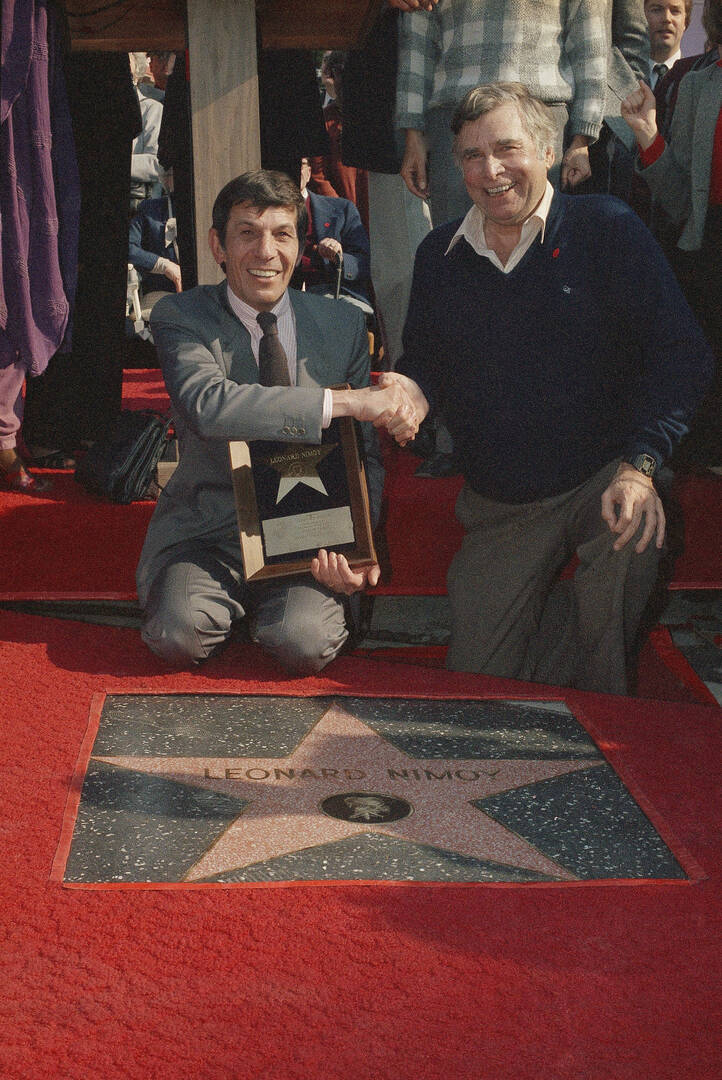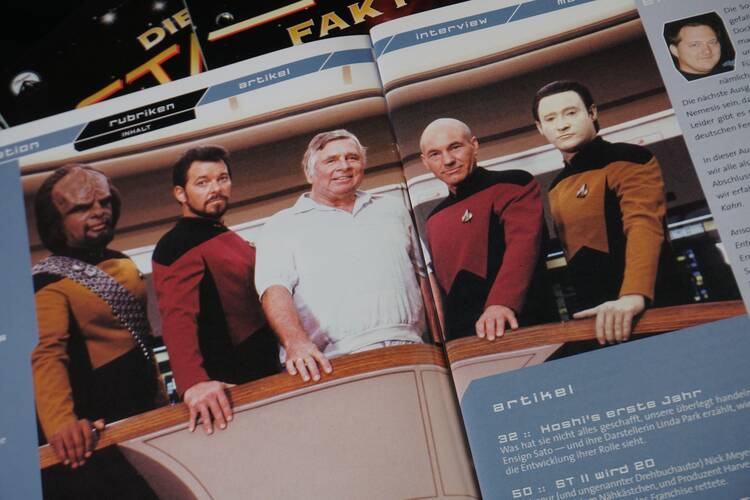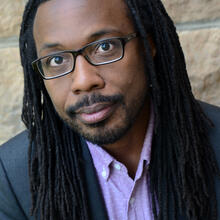In 2017, Gene Roddenberry’s son Rod, chief executive officer of Roddenberry Entertainment, wrote on Facebook, “I can tell you for certain that my father was as close to a true atheist towards the end of his life as could be considered.”
Yet documented evidence tells a different, more nuanced story about the creator of “Star Trek.” Gene Roddenberry, as it turns out, was what you might call an “anti-religious secular pantheist.” He rejected structured religion and espoused a utopic, humanist vision of the future, while actually believing that we, and the whole universe, are God. Given the ongoing impact of “Star Trek” as an almost mythic framework for our culture, Roddenberry’s theological vision is worth exploring.
Born in El Paso, Texas, in 1921, Eugene Wesley Roddenberry grew up in Los Angeles with a devout Baptist mother and a skeptic father who did not practice any religion. He often recounted that when, at the age of 14, he paid close attention to the sermon preached in his mother’s church, he concluded that the talk of eating Jesus’ flesh and blood was crazy: “I guess from that time it was clear to me that religion was largely nonsense—largely magical superstitious things.” He noted he “was more interested in the deacon’s daughter and what we might be doing between the services.” Roddenberry until his death was an unrepentant philanderer, well known in Hollywood for his extramarital affairs.
The Optimism of Star Trek
Young Gene made a quiet retreat from church life as soon as he had the autonomy to do so and learned not to speak openly about his opinions of religion in most circles, even when writing “Star Trek” in the mid-to-late 1960s. One of the best known and culturally embedded television shows of the 20th century, “Star Trek” lives in a fictional future inhabited by Captain James T. Kirk (played by William Shatner), his half-human-half-Vulcan science officer, Mr. Spock (Leonard Nimoy), and their multicultural, co-ed crew exploring the galaxy in the model of a non-satiric Gulliver’s Travels.
The speech that opens every episode sums up the premise well: Kirk and crew “explore strange new worlds...seek out new life and new civilizations...[and] boldly go where no man has gone before.” Alien races, space phenomena, interstellar conflict, time-travel antics—all designed to explore the human mind.

The show lasted for three years (1966-69), with 79 episodes. After the series’ 1969 cancellation, Roddenberry found himself speaking at newly germinated “Star Trek” conventions organized by like-minded fans, as well as to students on college campuses. His interest in science, philosophy and speculative fiction well prepared him to publicly reflect on his secular humanist ideas. They were right there in the DNA of “Star Trek.”
The show essentially proclaims: Humanity has a positive future to look forward to. We can and will learn to fix our most intransigent social problems. And if there is life outside our solar system, we will learn to coexist with it, being enriched by even greater diversity. All this will be accomplished without religion. We don’t need religion to help us transcend the limits of our existence.
Roddenberry described having to resist the interest among colleagues in his fictional starship, the U.S.S. Enterprise, having a chaplain. He flatly declined, stating there would be so much diversity of belief among humans—as well as aliens—that everyone would have to be their own chaplain.
Roddenberry’s Contradiction?
Within the body of those 79 original episodes, there are some instances that conflict with the persona of Gene the Atheist. In the early second-season episode “Who Mourns for Adonais?”, an alien antagonist who may have been the Apollo of ancient Greece captures the Enterprise crew and wants them to worship and adore him. Kirk rebuffs Apollo’s demands: “Mankind has no need for gods. We find the one quite adequate.” The “one” who is quite adequate, we assume, is the Judeo-Christian God. Perhaps this was just a rhetorical anachronism, allowed to remain in the script to appease the masses of American viewers who practice Christianity.
The most pronounced example of this surprising interaction with faith in a show created by an atheist appears later in the same season. The episode “Bread and Circuses” even included Roddenberry himself, listed as a co-writer. (As executive producer he would have approved every script; in this case he was intimately involved in its creation.)
In this episode, the Enterprise crew happens upon another planet of an identical humanoid species that exists in a parallel Roman Empire, but within mid-20th-century technological advancement. They even have a pacifist, rebelling slave class that worships what the Enterprise landing party assumes to be the “sun,” only to find out at the end, after escaping capture and returning to the Enterprise, that (spoiler alert!) the rebels worship the Son of God. Kirk explicitly makes the comparison to the Romans having not only a Caesar, but, per the rebels, also a Christ.
The writers imply that monotheism in general and Christianity in particular represent a natural evolution. A parallel pacifist and messianic religion was needed as a counteragent to imperial (polytheistic) Roman rule, a religion that could help lead to the utopia that has already been attained on Kirk’s Earth.
The fact that historical cultures were used to explore far-flung alien civilizations had to do more with budgetary needs than anything else. (Making aliens look “alien” is very expensive!) The show writers even developed an in-universe, science-y explanation that “Star Trek” characters called the Hodgkin’s Law of Parallel Planetary Development.
Yet Roddenberry the Philosopher’s goal was always to use his science fiction television show to comment on the current state of the world. War, racism, poverty, intolerance, and freedom of thought and speech were the bread and butter of the morality plays that undergirded each episode. But Earth itself, after many conflicts and the threat of extinction, would have evolved into a perfect society.
Humanity’s desire to grow would turn toward the vast galaxy with science and exploration becoming its hallmark tools. The adventures of the Enterprise allowed viewers to contemplate relevant human problems playfully hidden in fanciful tales of alien species. This was a powerful respite for a society at the time embroiled in the tumultuous years of the civil rights movement, the Vietnam War and a presidential assassination. “Star Trek” presented Americans with a hopeful future.
The Existential Journey of Spock
Nothing seems to have preoccupied Roddenberry’s imagination more than the question, “What does it mean to be human?” His most enduring personal proxy has been Mr. Spock. Over almost 60 years of new and complex characters, spanning almost one thousand “canonical” scripts for (still counting) 12 television series and 14 films, no one better embodies Roddenberry’s own inner story than Captain Kirk’s best friend.
When asked with which person in his life he was “most intimate,” Roddenberry responded unironically, “Spock.” Spock was a real person to Roddenberry, having sprung up from his imagination. He was the insider-outsider, conflicted by his dual heritage and wrestling to reconcile his almost gnostic Vulcan training to prize detached logic above all things with the ever-subtle suppressed emotional drive that had to remain submerged in the depths of his being.
Spock’s journey was Roddenberry’s journey. Roddenberry believed that he too was searching for life’s meaning. “Star Trek” producers were given the unusual opportunity to produce a second pilot episode, and Roddenberry was explicitly encouraged by the network executives to eliminate the “alien” and the “woman.” But Roddenberry defied the network and kept the alien. Spock was the only core character to survive. Roddenberry fought to keep him even when the female first officer, then simply known as “Number One” and played by his real-life mistress and later second wife, Majel Barrett, was cut. Jim Kirk may have been the classic and charming leading man, but Spock’s introspective, tortured personality turned out to be unexpectedly popular.

The character reached new heights in the franchise’s first feature film, “Star Trek: The Motion Picture,” in 1978. Spock, having left Starfleet years before, is on his home planet. He has almost completed “kolinahr,” the Vulcan rite of passage of a final purging of all emotion. In the depths of his consciousness, Spock senses the impending approach of a seeker of a new kind. He returns to the Enterprise and offers his assistance. This foreboding and menacing machine, V’Ger, has traveled light-years and threatens Earth. Spock’s insatiable curiosity leads him to reach out to the entity. Driven to better understand it, he leaves the Enterprise in a spacesuit to attempt a “mind meld.” Understanding demands a connection and connection requires risk. Spock wants to understand V’Ger.
Eventually rescued by Kirk from open space and now lying in sickbay with an uncharacteristic tear rolling down his face and a smile fueled by wonder, the ever-stoic Spock grabs Kirk’s hand: “This simple feeling...is beyond V’Ger’s comprehension. No meaning, no hope, and, Jim, no answers. It’s asking questions. ‘Is this all I am? Is there nothing more?’”
Later Spock is even more explicit: “V’Ger must evolve. Its knowledge has reached the limits of this universe and it must evolve. What it requires of its God...is the answer to its question, ‘Is there nothing more?’” V’Ger travels the galaxy all the way to Earth to find its Creator.
Regardless of how deep a connection Roddenberry felt to Spock, the character’s identity was shaped just as much or more by the Jewish identity of his actor, Leonard Nimoy. He reached into his ancestral experience and brought us the “Vulcan salute,” based on the priestly benediction blessing on Rosh Hashanah and Yom Kippur. Spock’s quest for knowledge had a religious undertone to it. You can find decently written icons of St. Spock, with only the mildest of irony, on the internet.
Roddenberry the Pantheist
Though the script of “Star Trek: The Motion Picture” was not written by Roddenberry, it was developed from another script by him called “The God Thing.” This theme would show up often in Roddenberry’s works. When asked to describe his thoughts about God in an interview with (former Jesuit) Terrance A. Sweeney in 1985, Roddenberry responded,
As nearly as I can concentrate on the question today, I believe I am God; certainly you are; I think we intelligent beings on this planet are all a piece of God, are becoming God. In some sort of cyclical non-time thing we have to become God, so that we can end up creating ourselves, so that we can be in the first place.
Roddenberry went on to say that in every other regard, he “insists on hard facts,” knowing that he cannot prove his pantheistic belief. “But I am almost as sure about this as if I did have facts, although the only test I have is my own consciousness.”
Roddenberry’s ideas about God are only ratified by a book-length dialogue between him and the writer Yvonne Fern, Gene Roddenberry: The Last Conversation. It was first published in 1994, but the conversations were recorded in the months leading up to Roddenberry’s death in 1991. Fern was married to the longtime “Star Trek” collaborator Herb Solow. Roddenberry invited her into a partnership to record his thoughts and reflections; only during subsequent interactions did he discover that she had for three years been a Franciscan nun and studied many religious traditions. He was shocked by this revelation, since he thought her too intelligent a person to have made a choice for devotion to religious life. But this fact eventually fascinated him, since he found her theological competency stimulating.
Fern clarifies for the reader that The Last Conversation is a portrait and not a photograph. It reveals perhaps as much about her as it does about Roddenberry. Two things become clear: He is not an atheist, but he is anti-religious.
“You’re pretty well known for not believing in God. Do you claim him now?” asks Fern.
“Oh—well, people are often pretty well known for things that are not true,” replies Roddenberry.
“Well, is it?” she responded.
“No, it is not,” Roddenberry said. “I believe in a kind of god. It’s just not other people’s god. I reject religion. I accept the notion of God.”
What does that mean? She presses him further on God and they dance; she asks him direct questions and he sidesteps. Finally, sounding hounded, he gives in.
“All right, God, to me, is intrinsic to humanity. To the whole cause of humanity. To the imaginative principle. To what we create, and think. He—or I should say It—is a source, yes, but more an involvement with the unknown. God is like the leap outside oneself, something that has no discernable source, but is a source.”
So how do we square this Gene Roddenberry, the one who acknowledges that there is a God who is “intrinsic to humanity,” with the one his son, Rod, later describes?
Rod said his father was “as close to a true atheist …as could be considered.” Maybe Gene made a final confession of pure atheism on his deathbed, so Rod could say with confidence that his father was an atheist. The evidence from the Fern interview, however, does not support that claim.
The Son’s View
In my own life I have found that some families want to maintain a more static image of a deceased loved one. Death offers the opportunity to do a complete assessment of a person’s life; it is, after all, the final frontier. Yet competing, perhaps unfavorable narratives can sometimes emerge, especially of a famous person like Gene Roddenberry, whose career was as tumultuous as it was prophetic.
Perhaps we could say Roddenberry, on a practical level, lived like an atheist. Yet it seems to me only right we take a person’s self definitions seriously. He said he was not.
The author Kevin C. Neece published The Gospel According to Star Trek: The Original Crew in 2016, doing the heavy-lift research that helped me see that pantheism is the appropriate descriptor of Roddenberry’s theological outlook. Was he an anti-religious pantheistic humanist? Or maybe he was a humanistic pantheist? I am not sure. Trying to define this now-historic figure too exactly runs the risk of creating a fiction that cannot be supported with facts.
Gene Roddenberry was throughout his life interested in theological questions. His method might be described as via negativa, the negative way. He was far more comfortable with clarifying what God is not than he was in systematically understanding what God is. And his stance against organized religion is well documented.
The third season of “Star Trek: Strange New Worlds” premieres in July. More than any other show, “Strange New Worlds” is a nostalgic callback to the original “Star Trek” not only in its setting as a prequel to Kirk’s crew, but also in its return to episodic, anthologized storytelling with smart, 48-minute solutions. It also bears the tongue-in-cheek cheer and good humor of the 1960s show. My hope is that “Strange New Worlds” does not shy away from some theologically rich storytelling. It would give secular society another safe and measured space to think about God, ultimate meaning and our place in the universe, as the original series did. In so doing it would certainly be fulfilling the vision of its creator.








